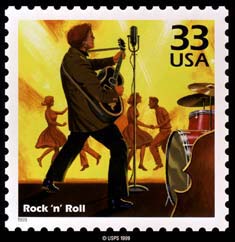Don Bogen writes with a cracked, dry Prairie voice and suggests to some that he’s a latter day Carl Sandburg. Perhaps, but the comparison deals an unfair hand to a good poet, since the late poet’s name evokes certain qualities that are carved in the soft clay of consciousness; should the contrast stick, Bogen will never get fair reading for his own work. He’s obviously influenced by Sandburg, but like any writer with a style he or she can rightly claims is theirs, he's developed a voice wholly his own. He has a particular mastery of negative capability, assuming a guise hardly his own and not of human form at all and manages without winking irony or obnoxious purple passages to describe the construction of a house from the house's point of view . We see this in his poem
“House”, recently posted by poetry editor Robert Pinsky at Slate.com.A neat trick, a hard one to pull off, since it requires keeping so many things in balance and a great many potential bad writing habits in check. Interestingly, it is a poem about something being built, an architecture that is coming into being rather than the easier ploy of composing a poem to mark the degradation of a landscape, a house, a whole town; writers write so much about things in decline simply because the worse and gamiest things of existence are the easiest to imagine. The final effect of this, we know, is reader weariness over reading yet another poem writ in fits of routine despair or template-constructed ennui. All the polarized words , the sad similes, the morose metaphors about aging, decline, failing eyesight, death blur into one another not unlike one Bill O'Reilly self-deconstruction after another, a sheer babble of grief , and despondency that moves the reader only to turn the page, or close the book they thought might give them a spark. Bogen achieves his problematic task with an efficient set of divisions that has the house quite literally describing the progress of his construction by declaring what it was he was at each stage , with the addition of planks, floor boards, the whirl and grind of band saws and slamming of nails with appropriate hammers,
I was plaster, I was rubber and glassMy joists, my iron ligaments grew invisibleI took on angles, gable and dormer and plumb back doorI blocked the wind, I was rooms each linked to anotherDucts and vents gave me unityWomen came, their hands on my wallsI was whitewash and would be paint and would wear clothEqual parts pain and anticipation, the silent yet aware intelligence of the house narrates its own becoming, speaking of said Schmidt only as his builder, his principle designer, assigning him, it might be suggested, the position of an archetypal God , suggesting a culture of houses, created among themselves, a shared cosmology this house shares with "my brothers" who all "stood up in the field". Sandburg wrote the haunted "I Am The Grass" where the obvious message was that all things that come from the earth will, in time, return to the dust from which they symbiotically sprang, and Bogen's poem is a response to this famous ode, giving the reader the message that death is always eternal is and unforgiving, then creation and construction and the embrace of life with all imaginative force is constant and unstoppable. Bogen masterfully embeds that passion to live and create community within the houses we build for ourselves to live in. I am envious of his language, with its sparing use of adjective and overactive metaphor, and I quite admirable at the poetic resonance he provides--the suggestions of qualities and significances that fall just outside the sentence content--using this sweetly idealized plain speak. One of the best poems I've read in this series in a long while.Sandburg is the crisp realist that rob says, but the style, evoking curling paint, eternal autumn and hills full of leafless trees and occasional farm ho uses very often lends itself to greeting card sentiment. The dark side is there, yes, and therein lays his genius, but often times his scenes of Americana reduce themselves to Norman Rockwell paintings. Technical mastery, a huge popularity, an undeniable brilliance, and a conspicuous streak of the corny.
The interesting thing about good stage set design is that the two- dimensionality of the props, when done well, make the theater attending to consider the context deeper than had the scenery been ruthlessly "realistic". The abstracted, simplified and stylized look of the scenery, the props works with the text and brings about a theatrical result. Bogen does this rather well; giving the house human speech and having it tell us of its construction, its "birth". All consideration of this being a "real" house go out the window, and we suspend our disbelief long enough to gather some impressions about houses and what we call homes in another way, a perspective not previously available.
The Williams is good, great in fact, and he's one of those who can discourse at length about something and not allow himself to get weighed down with the sheer bulk of his details or to get stalled in a tangential cul-de-sac. There is a discourse going on here, the work of a noticing eye that can bring description to a more discerning level; the relations of the things in the world man has created them for are revealed and surprise us.The difference between this poem and Bogen's, though, is that "House" is not merely a detailing of how comes to stand on a particular hillside alongside other homes. The house, in fact, is the narrating persona, a consciousness of a sort that Bogen presents, subtly, as recounting its "birth" and, perhaps, retelling a creation myth. What is implied here--a community of buildings with shared purpose, culture, familial bonding, mythology--are large but smartly kept off stage, conspicuous by their absence.
The description of the house in the various states of creation all give indication that there is a fulfilling of a fate here, a sense of predestination the house, in this imagining, is aware of and both accepts and looks forward to.
Let's not generalize too much about the difference in tastes between men and women. The language contains those references that could handily appeal to both sexes, touching lightly on gender stereotypes; the talk of materials, tools, techniques for the men, and the declaration of what kind of home it would be for women. A house, a home more specifically, is made of many elements, and the house's persona speaks to those distinctions.






